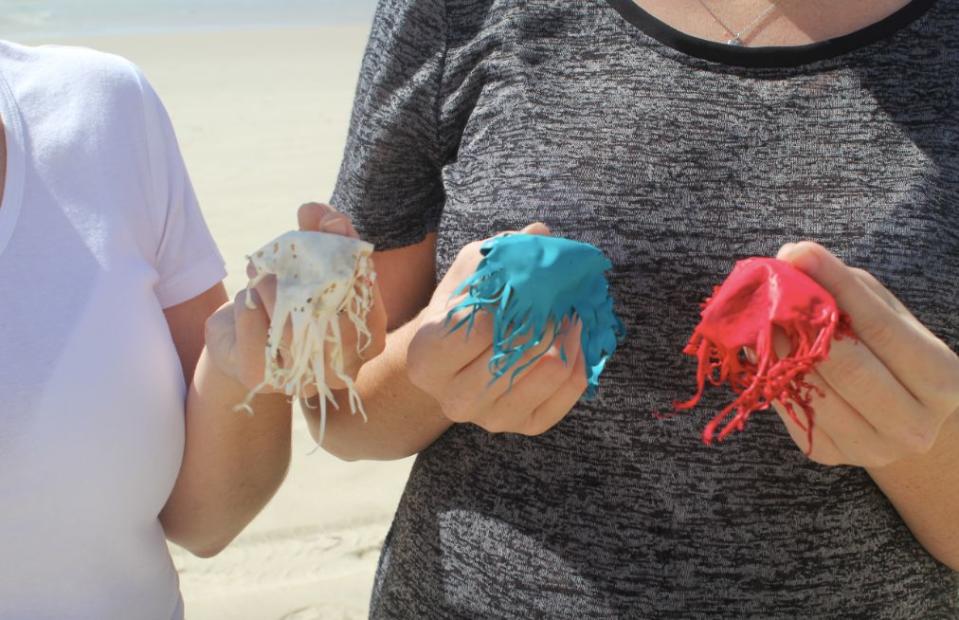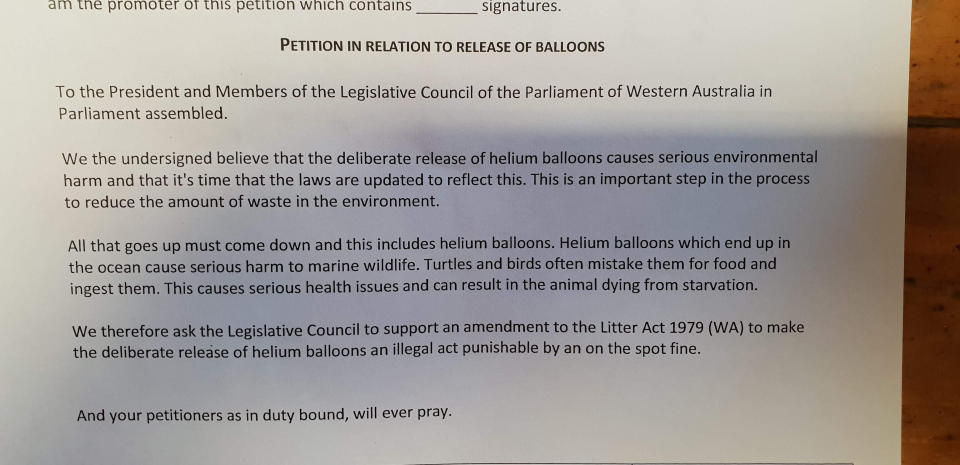'Act before it’s too late': The dangers of helium balloons to sea turtles
Wildlife conservationists are pleading for Australians to stop releasing helium balloons in a bid to protect the dwindling population of sea turtles.
When balloons are released into the sky, they later burst, with many forming the shape of jellyfish – a staple of seven turtle species’ diets.
Falling into the ocean, turtles often confuse the balloons for jellyfish, a mistake which regularly proves fatal with the animals unable to digest the latex.
“They pop in a way that they shred down the sides so they actually represent jellyfish,” conservationist and campaigner Lisa Jane Hills told Yahoo News Australia.
“It’s often the bright colours that attracts the turtles to eat them.”

Turtles are unable to throw up the balloons and as gas is released from other foods they digest, the reptiles begin to float and suffer a long and painful death.
The dangers turtles are facing are highlighted in the feature-length documentary, Rubber Jellyfish, which explores the dangers sea turtles are facing due to helium balloons.
Canberra born Carly Wilson, who is behind the documentary, said balloon manufacturers often claim their products are biodegradable.
“The scientific literature told a different story, though,” she said.
A University of Queensland study in 2012 found that 78 per cent of the plastic ingested by deceased turtles it studied was from helium balloons.

Their study confirmed turtles were wrongly identifying the remnants of balloons as a food source.
Conservationists say organised mass releases of balloons are proving devastating for the population of turtles.
Ms Hills said while balloons released near the coast pose the most serious threat, mass releases inland can also find their way into the ocean.
She referenced Lorde Howe Island, 600km east of Australia’s mainland, where balloons are often found despite them not being sold on the island.
Education needed
Whether it be for weddings, memorials or promotional purposes, the release of hundreds of balloons at once is catastrophic for marine wildlife.
Ms Hills, whose work has seen a ban on releasing helium balloons provisionally approved in her Perth suburb of Fremantle, said that a nationwide push on education is needed to reduce the release of balloons.
“There is an out of sight and out of mind attitude that people have,” she told Yahoo News Australia.

“People don’t think beyond letting go of that balloon. Once you explain they see it completely different.”
Ms Hills revealed that balloons are in the top 3 plastics ingested by marine wildlife.
The issue is a widespread problem across Australia, with Northern Territory cruise and tour company Sea Darwin highlighting the spread of the issue.
Australia has some of the largest marine turtle nesting areas in the Indo-Pacific region and has six of the seven species of sea turtles on the planet.
The company completed their annual clean-up of Bare Sand island during the first weekend of May and while they were pleased to announce a drop in plastic waste retrieved, they found 20 burst helium balloons.
“From a tiny island, only 1.9kms in circumference, with six of the seven species of sea turtles in its waters, this is way too many balloon skins,” they wrote in a blog post.
Push to ban the release of balloons
Ms Hill’s campaign not only wants to spread the word in WA but across the nation and follow in the footsteps of several states across the US which have banned the release of helium balloons.
Having played a hand in Fremantle’s plans to pass a by-law which bans the release of helium balloons in the area, she is now pursuing a law change with the state government.
She currently has a petition which is 2,000 signatures strong and growing.
“I personally feel like we’re at that stage when we can reduce any single use item out of our lives it’s really important,” she said.

Coinciding with World Turtle Day on May 25, she is urging Australians to write to the federal environmental minister, Melissa Price, and state equivalents to call for a ban on the release of helium balloons.
“I think an important message here is that turtles are endangered for a reason, for too long we have put pressure on them, with marine debris and climate change,” Ms Hills said.
“And now is the time to act before it’s too late. No more talk of educating... we need to see action.
“We need to think logically about our actions and I just think releasing balloons is something we can live without.”
Anyone who wishes to join Ms Hill’s petition can email boycottbaloonsfremantle@hotmail.com .
Do you have a story tip? Email: newsroomau@yahoonews.com.
You can also follow us on Facebook, download the Yahoo News app from iTunes or Google Play and stay up to date with the latest news with Yahoo’s daily newsletter. Sign up here.




